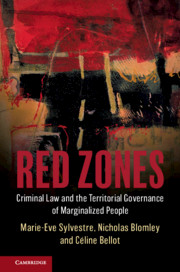Book contents
- Red Zones
- Red Zones
- Copyright page
- Dedication
- Contents
- Figures
- Maps
- Tables
- Acknowledgments
- Cases
- Legislation
- 1 Navigating the Territories of the Law
- Part I Foundations
- Part II Expansion
- 4 Territory Widening
- 5 The Shifting and Expanding Terrain of Criminal Justice Management
- Part III Territorialization and Its Consequences
- Conclusion
- Bibliography
- Index
4 - Territory Widening
from Part II - Expansion
Published online by Cambridge University Press: 06 February 2020
- Red Zones
- Red Zones
- Copyright page
- Dedication
- Contents
- Figures
- Maps
- Tables
- Acknowledgments
- Cases
- Legislation
- 1 Navigating the Territories of the Law
- Part I Foundations
- Part II Expansion
- 4 Territory Widening
- 5 The Shifting and Expanding Terrain of Criminal Justice Management
- Part III Territorialization and Its Consequences
- Conclusion
- Bibliography
- Index
Summary
Chapter 4 explores recent trends in the administration of justice, using extensive court data obtained from Montreal and Vancouver. It also provides the opportunity to explain in some detail the current legal framework governing bail and community sentences in Canada and contrast it with legal practices elsewhere. The data reveal the widespread prevalence of territorial conditions of release at all stages of criminal proceedings, including at bail, where they should by law be exceptional. Such conditions, in turn, generate numerous breaches, which constitute criminal offences against the administration of justice. Echoing the concept of “net widening” (Cohen, 1979; 1985), this chapter suggests that conditions of release have directly contributed to a form of “judicial territory widening”, leading to the enlargement and expansion of the criminal justice system, affecting particularly marginalized populations.
Keywords
- Type
- Chapter
- Information
- Red ZonesCriminal Law and the Territorial Governance of Marginalized People, pp. 59 - 104Publisher: Cambridge University PressPrint publication year: 2020

